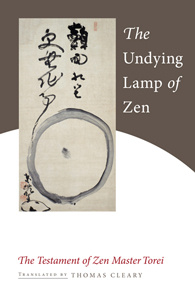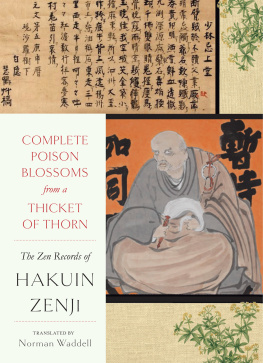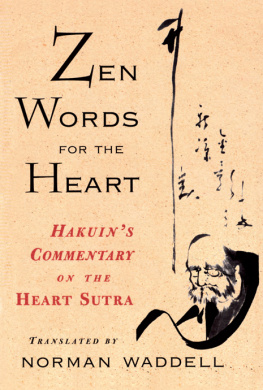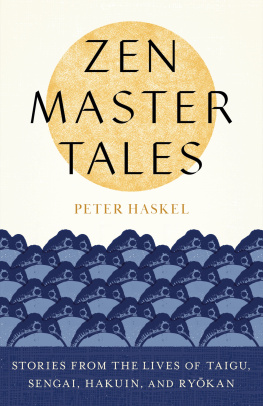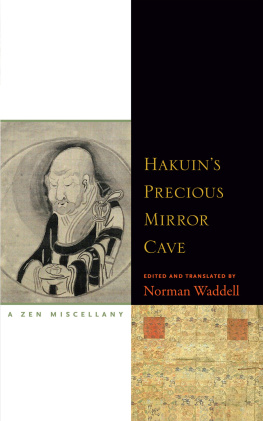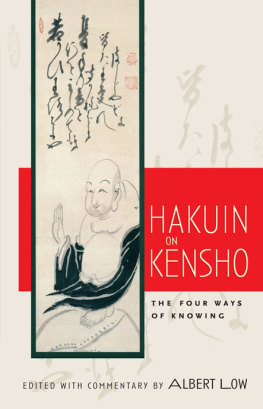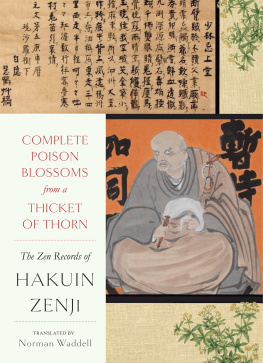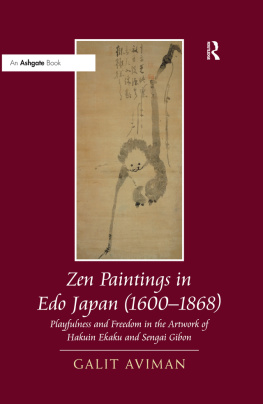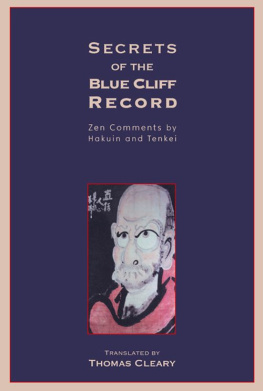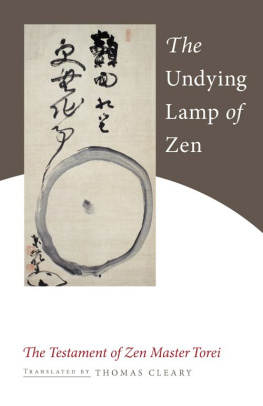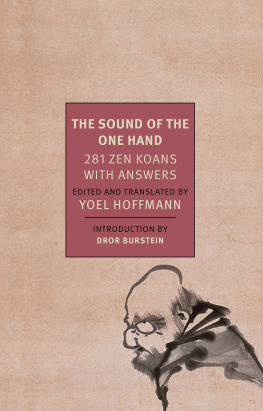Norman Waddell presents the cranky, impassioned master Hakuin with an uncanny sense of Right English. Now we know you, old Hakuin.
Robert Aitken, author of The Practice of Perfection and Taking the Path of Zen
A rich and rare glimpse into a Zen masters comments on his own spiritual journey, translated for the first time. A welcome and recommended addition to the canon of Zen literature available in English.
Library Journal
ABOUT THE BOOK
A fiery and intensely dynamic Zen teacher and artist, Hakuin (16851768) is credited with almost single-handedly revitalizing Japanese Zen after three hundred years of decline. As a teacher, he placed special emphasis on koan practice, inventing many new koans himself, including the famous What is the sound of one hand clapping? This English translation of Hakuins intimate self-portrait includes reminiscences from his childhood, accounts of his Zen practice and enlightenment experiences, as well as practical advice for students.
NORMAN WADDELL is a professor of international studies at Otani University in Kyoto. He is also the translator of The Essential Teachings of Zen Master Hukuin and Zen Words for the Heart: Hakuins Commentary on the Heart Sutra.
Sign up to learn more about our books and receive special offers from Shambhala Publications.

Or visit us online to sign up at shambhala.com/eshambhala.
Wild Ivy
THE SPIRITUAL
AUTOBIOGRAPHY
OF ZEN MASTER
HAKUIN
Translated by
Norman Waddell

SHAMBHALA
Boston & London 2011
Shambhala Publications, Inc.
Horticultural Hall
300 Massachusetts Avenue
Boston, Massachusetts 02115
www.shambhala.com
1999 by Norman Waddell
Cover art: Pilgrim Monk on a Bridge by Hakuin
All rights reserved. No part of this book may be reproduced in any form or by any means, electronic or mechanical, including photocopying, recording, or by any information storage and retrieval system, without permission in writing from the publisher.
The Library of Congress catalogues the previous edition of this book as follows:
Hakuin, 16861769/
[Itsumadegusa English]
Wild ivy: the spiritual autobiography of Zen Master Hakuin Itsumadegusa/translated by Norman Waddell.
p. cm.
eISBN 978-0-8348-2319-8
ISBN 978-1-57062-435-3 (cloth)
ISBN 978-1-57062-770-5 (paperback)
ISBN 978-1-59030-809-7 (paperback: alk. paper)
1. Hakuin, 16861769. 2. Priests, ZenJapanBiography. 3. Spiritual biographyJapan. I. Waddell, Norman. II. Title.
BQ 9397.E597H3513 1999
294.3927092dc21 98-39907
[B] CIP
H akuin Ekaku (16861768) is a towering figure in Japanese Zen. Widely respected during his lifetime for the extraordinary courage and determination and uncompromising independence he displayed as he strove tirelessly to revive a Zen tradition in a state of deep spiritual stagnation and decline, during the two and half centuries since his death, he has assumed patriarchal significance in his school and has remained to this day an overshadowing presence whose life and work have become emblematic of the truths he espoused.
Part of the reason for the unique position Hakuin has continued to hold is undoubtedly to be found in the uncommon literary and artistic legacy he left behind. He excelled as a writer, painter, and calligrapher and used these talents fully over the final decades of his life as he tried to devise new ways of spreading the Zen teachings among people of all classes and walks of life. The result is a body of workvoluminous writings and countless ink drawings and calligraphic inscriptionsthat is both a powerful expression of his prodigious, exuberant personality and a vivid testimony to his profound spiritual awakening.
Working within a tradition in which priests are unusually tight-lipped about their personal stories and autobiographies are almost nonexistent, Hakuin left a record of his life and religious experience that in both extent and detail is without parallel in Japanese Buddhism. This inclination to talk about his life increased with age, becoming in his seventies and eighties a prominent feature of his teaching style. It extended to his paintings as well. The well-known series of self-portraits he drewthemselves a form of autobiographydate from this period, as do his depictions of other Buddhist priests and familiar figures from Buddhist folklore, such as Bodhidharma and Pu-tai, many of whom bear an unmistakable resemblance to their creator. The persona Hakuin created of himself through his writings and visual art has for later generations of students epitomized the Zen life. In recent decades, it has gained him recognition beyond the confines of his native land as one of the worlds truly great religious figures.
This book is a translation of Hakuins spiritual autobiography Wild Ivy (Japanese, Itsumadegusa), which he wrote at the age of eighty-one, two years before his death. It is the longest and most comprehensive of the autobiographical narratives contained in his writings and the principal source for roughly the first three decades of his lifethe period during which he was engaged in his struggle for enlightenmentcontaining many events and episodes that cannot be found elsewhere. As such, it has considerable value and interest as straight biography, both for the factual events it records of his life and for the vivid firsthand descriptions of the decisive episodes that occurred during this crucial period in his spiritual growth and development.
But Hakuins principal motive for relating his story was clearly instructional. He believed that by telling others about his experiences, he could encourage them in their training and that in so doing he could clarify his basic approach to Zen study and help students avoid falling victim to contemporary teachings that he felt were destroying the Rinzai schools time-honored tradition of koan study. To this end, he frequently breaks the narrative to press home a point or lesson he believes to be of special importance to the student. These digressionswhich tend to give Wild Ivy a somewhat episodic, disjointed qualitytake the form of short moral tales, scathing attacks on the views of heretical contemporary Zen teachers, as well as direct exhortations of advice and caution to students.
Wild Ivy, like Hakuins other autobiographical narratives, is related from the vantage point of the mature teacher. Events are shaped and reshaped through reflection and religious argument as well as by the dynamics of the storytelling itself. Certain themes and episodes that have come in the course of time to assume greater importance to him receive correspondingly more attention. The harm wrought by contemporary teachers with their doctrine of Unborn silent illumination Zen and the greatness of his teacher Shju Rjin are cases in point. As in any autobiography, there is some degree of exaggeration and embellishment, an occasional stretching and bending of the facts. Hakuin is usually the only source for the accounts he gives. Moreover, he relates many of his stories in more than one version. Inevitably, this gives rise to discrepancies and disparities of various kinds, which are at this point difficult, and sometimes impossible, to reconcile.
All that said, I believe the overall evidence still suggests that Hakuins account of his life is accurate in its general outlines. Since my main purpose here is to translate what Hakuin wrote in Wild Ivy, I have limited myself in the supplementary notes to pointing out only such inconsistencies and contradictions as I felt to have some special interest.
Next page
